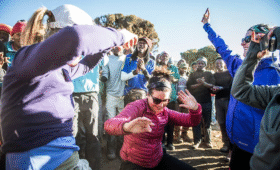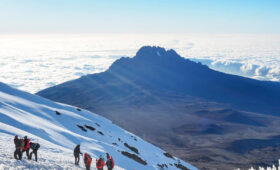How Fit Do You Need to Be to Climb Kilimanjaro?
Mount Kilimanjaro may be the highest mountain in Africa, but the good news is you don’t need to be a professional athlete to climb it. That said, a good level of physical and mental fitness is crucial for reaching the summit safely and successfully.
At Mandari Travel, we’ve guided people of all ages, shapes, and fitness levels to Uhuru Peak. Here’s a realistic look at how fit you need to be to climb Kilimanjaro, and how to prepare.
You Don’t Need Technical Climbing Skills
Unlike many high-altitude peaks, Kilimanjaro is a non-technical trek. There’s no need for ropes, ice axes, or climbing gear. However, it’s still a tough multi-day hike at high altitude.
You’ll be walking between 4 to 8 hours a day, sometimes longer on summit night, and gaining elevation steadily, so general trekking fitness is ke
What Kind of Fitness Do You Need?
1. Cardiovascular Endurance
Your heart and lungs will be under pressure at high altitudes where oxygen levels drop. Training with aerobic exercises like hiking, running, cycling, or swimming 3–4 times per week is ideal.
2. Leg Strength
Strong legs reduce fatigue and help you handle long descents. Focus on:
- Hill walking
- Lunges and squats
- Stair climbing with a backpack
3. Core & Stability
Good core strength improves balance and posture, especially when carrying a daypack. Try adding planks, yoga, or Pilates to your routine.
4. Hiking-Specific Practice
Train by doing long day hikes with elevation gain. Practice walking on uneven terrain with a loaded backpack (5–7kg) to simulate trek conditions.
The Real Challenge? Altitude
Fitness alone won’t protect you from altitude sickness (AMS). Even the fittest climbers can struggle with lower oxygen levels above 3,000 meters. That’s why choosing the right route and acclimatization schedule is just as important as your fitness.
Mandari Tip: Opt for longer routes like Lemosho (8 days) or Machame (7 days) to give your body time to adjust.
Who Has Successfully Climbed?
We’ve guided:
- Children as young as 10
- Adults over 65
- People with no prior trekking experience
Success comes down to preparation, a positive mindset, and choosing a trusted operator like Mandari Travel with experienced guides who pace the climb properly.
How to Train (Sample Plan)
3–6 months before climb:
- 3x/week cardio (30–60 min)
- 1–2x/week strength training
- 1x/week long hike or hill walk (3–6 hours)
1 month before climb:
- Simulate back-to-back hiking days
- Practice walking with your daypack
- Prioritize rest and hydration
Email: info@mandaritravel.com
📞 Call/WhatsApp: +255 750 900 811
Let Us Help You Train Smart
When you book with Mandari Travel, we don’t just get you to the mountain, we help you get ready for it. From fitness plans to gear checklists, we’ve got you covered. Fill out the form below to request a quote and free prep guide.




